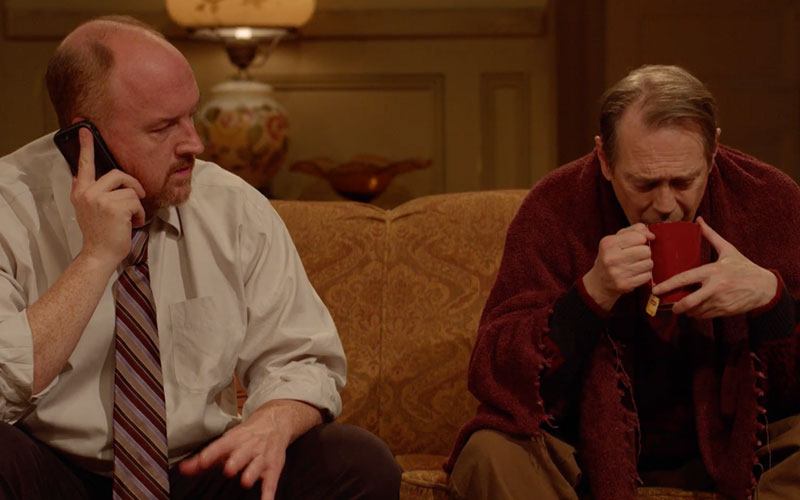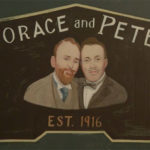Saturday morning, I got Louis CK’s email saying simply, “Horace and Pete episode one is available for download. $5. Go here to watch it. We hope you like it.” Others have already pointed out his Beyonce-esque technique of putting something out with no prior warning, which is intriguing in that the complete lack of fanfare ironically confirms the status possessed by the artist. Because it’s Louis, I watched it that very Saturday night.
Horace and Pete opens on the titular characters opening their titular bar for the day. CK plays Horace, in jeans and a tie, the reluctant bar owner. Steve Buscemi plays Pete who, dressed in a drab gray coat over a Cosby sweater, seems to be the kind of guy whose career as a bar back is actually a success story. Horace also has a beautiful young girlfriend Rachel (Rebecca Hall) who is smitten with him, though, his body language betrays his doubts.
At opening – 1:00PM – “the regular crowd shuffles in” as the fella says. This crowd consists of Louie comedians Nick DiPaolo, Kurt Metzger, and Steven Wright but also Alan Alda, Jessica Lange, and, later, Edie Falco, playing Horace’s sister Sylvia.
Louis said that he wanted Lucky Louis, his previous, little seen HBO sitcom, to be like The Honeymooners and this piece seems to exist in that vein. What follows is a reenactment of the bar where the characters from “Piano Man” drink on weekdays.
I couldn’t take my eyes off of Alan Alda but his surly bartender Uncle Pete with the “we served n*****s in the thirties so I’m no racist” schtick is a little too on the nose (and yes, I know the bit but I’m still not typing the word). Later, Horace’s sister arrives with her “Jew lawyer” who also happens to be a “faggot.” It’s a small mercy that no Puerto Ricans or Muslims entered the bar that day. Jessica Lange’s Marcia is a bitter barfly and ex-girlfriend of the deceased elder Horace. The other patrons provide ambient talk of mild flirtation and literal bar stool politics. And later in the show, we continue with the twenty first century entertainment dictum that for all marriages before roughly 1975, the domestic violence rate was a firm 100%.
As is done continuously with anything Louis does, both the New York Times and the New Yorker praised this new show (if it even is a show, it felt much like a one off to me). I even omitted my “episode of Cheers written by Eugene O’Neill” joke above because both articles made it. I’ve stopped looking at other reviews after those two but I have to say, I’m not so quick to praise. There’s just something off about the whole production. The moments that are supposed to pack the most punch fail to distinguish between drama and impassioned laundry lists of grievances that occurred in the past. Buscemi’s Pete’s unnamed mental illness swings for the fences both in its portrayal and as commentary on our health care system.
I’m still trying to figure out what this was. Is it an hour-long three camera drama? Is it a filmed play? A teleplay?
As an improviser, I had the feeling that I was watching a monoscene. (A monoscene is an improvised form and much like a one act play. Everything takes place in one location on stage.) I was thinking that this is kind of awkward and not very good, but, upon some reflection, I think it’s improvised, improvised the way that Curb Your Enthusiasm is improvised, with knowledge of characters and story arc but no actual script.
Hear me out. (And here be spoilers.)
Both the Times and the New Yorker mentioned that this was taking place on the day before the Iowa caucus. Neither, however, mentioned that this episode names the two teams that are in the Super Bowl this Sunday. They wouldn’t have known that until after last Sunday January 24th when the Broncos and Panthers both won their respective games. This leads me to believe that this was filmed last week between the 24th and 30th when the email announcing the show was sent.
Okay, yeah, they could have written and rehearsed for years up until filming last week and inserted the proper names at filming. But this fact, along with some stumbles and awkward line readings, makes for an extemporaneous feel to the whole production. It’s far from definitive proof but it gives me a gut feeling and I’m listening to it.
The show is littered with many impassioned monologues but also a lot of awkward statements of relationships. There’s a lot of exposition and talking about the past. That often happens – though, not ideally – in improv. There were a lot of you statements. “You are my dad.” “You were my dad’s dad’s last girlfriend before he died.” Horace’s daughter Alice (Aidy Bryant) says to Uncle Pete, “what about your daughter Cathy? My dad’s cousin Cathy, what about her?” Uncle Pete angrily shouts back, “What is that supposed to mean? What? You trying to make me feel bad because my daughter died?” If this is family, everyone knows that Cathy is Uncle Pete’s daughter, Horaces’s cousin, and that she is dead. It’s as if they’re reminding themselves of the facts, or, perhaps, confirming and yes anding discoveries.
Louie did dramatic conflict well. You need only look to the episode Nick where he gets into a fight with Nick DiPaolo over politics or the Eddie episode with Doug Stanhope for a dramatic confrontation that works. So, we know that Louis, the writer of Louie, is capable of it. Why didn’t he do that here? My guess is because it was improvised.
There’s also a big inconsistency.
In the second act, it is revealed that Uncle Pete is Pete’s (Steve Buscemi Pete’s) father, which shocks everyone and means that Horace and Pete aren’t brothers, they’re cousins. Uncle Pete’s explanation is that he gave his son away to be raised by Horace’s father Horace because Uncle Pete “doesn’t like kids.” Even if we accept the fact that you can just give a kid to your cousin to raise because you don’t feel like it, as noted above, Uncle Pete had a daughter Cathy who died.
So, just to be clear, Uncle Pete raised a daughter who tragically died but he gave away another kid to his cousin because he doesn’t like kids? And in the fifty plus years of these characters lives the questions of resemblance or even baby pictures never came up? That doesn’t even bear the scrutiny of an initial skim of a script. A change of heart or circumstance on the part of Uncle Pete could explain it but that’s really weak. Frankly, missteps like this are only forgivable in improv because there’s no turning back from an inconsistency.
And, finally, it’s the thank you at the end. Louis CK thanks playwright Annie Baker, Loren Michaels, Joe Pesci (?), Pamela Adlon (as always), Mary Szekely (his oldest daughter, I believe), and – the most interesting one – Mike Leigh.
Mike Leigh is a celebrated filmmaker who uses improv to bring about his movies. Characters are created through rehearsals and then filmed, without a script.
So, I think that it was improvised. Actually, no. I really hope that it was improvised. Because if it was, Louis essentially got together with some friends and made a teleplay and then distributed it to his email list for purchase for five dollars, expanding his successful online model to other projects besides stand-up specials. It was an experiment for seasoned actors and a big change for a comedian who seems to be pushing himself out of his comfort zone. It’s impressive and it’s a risk and that’s awesome.
If, however, it wasn’t improvised and this was totally scripted, then, frankly, it was drama porn that needed some workshopping or, at the very least, a second draft.




